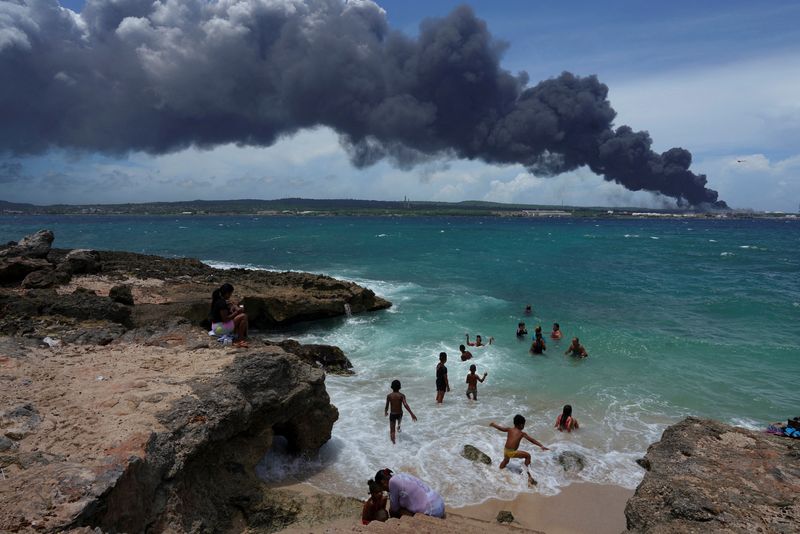Major fire spreads at Cuban fuel storage facility hit by lightning
2022.08.07 02:57
8/8

People enjoy the beach near the smoke of a fire over fuel storage tanks that exploded near Cuba’s supertanker port in Matanzas, Cuba, August 6, 2022. REUTERS/Alexandre Meneghini
2/8
By Marc Frank
HAVANA (Reuters) -A second fuel storage tank near Cuba’s supertanker port in Matanzas exploded on Saturday morning following a blaze which burned through the night after lightning hit another tank on Friday evening.
Cuban state-run television said at least 67 people were injured in the second blast and 17 firefighters were unaccounted for. Civilians had already been evacuated from the area.
Health minister José Angel Portal Miranda said in a Twitter (NYSE:TWTR) post that of those injured, three were in critical condition, three very grave and another 12 were in a “grave” condition.
Seven patients were transferred to hospitals in the capital, Havana.
President Miguel Diaz-Canel visited the scene 80 miles east of Havana around midnight and returned during the morning as state-run television broadcast live coverage of the unfolding disaster.
Diaz-Canel posted on Twitter before the second blast that first responders were “trying to avert the spread of the flames and any spill of fuel” into the Matanzas bay.
A later tweet from his office said Cuba was asking friendly nations for advice to put the fire out.
By Saturday morning the fire appeared completely out of control, threatening other nearby fuel storage tanks as smoke reached Havana.
A paramedic at the scene, who asked not to be identified, said by telephone that cold water was being poured on nearby tanks.
Cuba is suffering from daily blackouts and fuel shortages and the loss of fuel and storage capacity is likely to aggravate the situation.
Jorge Pinon, director of the University of Texas at Austin’s Latin America and Caribbean Energy and Environment Program, said the area had eight big tanks each with a capacity of 300,000 barrels.
“The area is a transshipment point for fuel to various thermo-electric plants, not just the one nearby, so this could be very bad news for the power grid,” he said.








